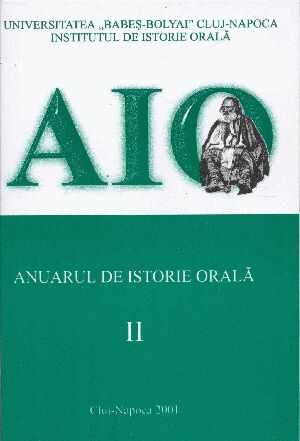Rezistenţa anticomunistă în zona Huedin. Grupul "Capota-Dejeu"
"Resistance against Communism in Huedin region "Capota-Dejeu" Group
Author(s): Cornel JurjuSubject(s): History
Published by: Argonaut
Summary/Abstract: For Romania, confronted with a forced communist setting-up the end of the Second World War ment a deep discontinuity in connection to the particularities of politic, economic and social system interwar, having ideologica!Right or Central-Right aspect. As a consequence, even at the first step of communist system in Romania, the interaction between new communist power and Romanian society was confronted with an evident ideologica! separation that shortly generated conflicts more or less important. As it is already known, one of these forms of manifestation of such an evolution consisted on appearance of more rezistence against communism groups that functioned in different parts of Remania: Făgăraş, Banatului, Maramureş Mountains. We have to remind that all these groups that preferred the mountains to act, took place in the first years after the war some of them remaining active up to the end of the 50s arid the beginning of the 60s. In fact, this chronological reality is also proper to Huedin zone, a significant place for the rezistence against communism although not well-known, where during 1946-1948 three groups took place: "Capota-Dejeu" group, "Şuşman" group and "Cross and Sword" group. Fruitful in activity, the activity of "Capota-Dejeu" group -the subject of our study- was concentrated on two major personalities of Huedin aft:erwar: Iosif Capota and Alexandru Dejeu. We took into consideration 15 interviews from Oral History Institute Cluj-Napoca during research campaignes in 1998, 1999. The intervievees, men and women were close to Capota and Dejeu; during the interviews campaign they were 60-90 years old. According to these documentory acts, we had in mind: a brief look on Capota and Dejeu biographies up to the moment they joined the rezistence (1946-1947), the clandestine itinerary of Iosif Capota up to December 1957 when he was arrested; the important moments of their activity together with their friends; the strategy used by Security in order to discover the group and arrest them; the trial, verdict and execution of Capota and Dejeu in September 1958 in Gherla prison.
Journal: Anuarul Institutului de Istorie Orală
- Issue Year: 2001
- Issue No: II
- Page Range: 243-264
- Page Count: 14
- Language: Romanian

